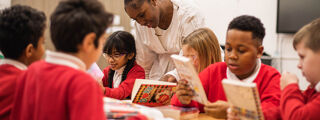Project Aims:
Making Gender Equality Matter in Schools (MGEMS) makes a direct response to concerns evidenced in the research literature that policy commitments to gender equality in Vietnam have not yet been securely translated into the everyday practices of schooling in ways that secure fair and equal experiences and outcomes for girls and young women. The literature identifies the transformative potential of teacher education, and teacher educators as key actors, in addressing this challenge and MGEMS and the evidence base and assets generated through MGEMS will support development of a novel and innovative teacher education offer to be piloted in two case study regions of Vietnam.
The core aim of MGEMS is to respond to the need to develop effective and engaging teacher education opportunities for new and existing teachers that facilitates:
- reflexive exploration of their own experiences of schooling and gender identity making and taking;
- critical examination of their own beliefs and values;
- exploration of the ‘hidden curriculum’ visible, bringing it into view and opening it up to examination;
A challenge to the ‘genderedness’ of resources and materials and encourages re-framing, critical discussion and production of resources that promote gender equality; new teachers to be inspired and enabled to confidently develop critical pedagogies that promote gender equalities in highly practical ways.
The MGEMS project will generate a range of creative and innovative learning encounters and resources that pay attention to experiences of schooling and open up discussions with new and existing teachers about voice, identity and learning. In so doing MGEMS will provide important opportunities for reflection on gender relations and the way they impact on access, participation (including discipline choices) and persistence in education as well as education outcomes, aspirations and post-school destinations. These conversations will be firmly located in local social and cultural contexts and afford departure points for participants to explore gender relations within their own schools, communities and, for existing teachers, workplaces.
MGEMS will also impact on the wider school cultures within which MGEMS alumni go on to work, whether as new or existing teachers. This has the potential to benefit significant cohorts of young people as they encounter teachers with more critical, research and evidence-based informed perspectives that challenge inequality and enable young people to understand themselves, their potential and their aspirations very differently. The inter-sectional nature of MGEMS will also provide new perspectives on the ways that gender inter-sects with disability, race and other social characteristics to open up wider discussions about structural inequalities and how they might be challenged.
Project Team:
Julia Everitt
Project Impacts:
MGMES will produce a new online ‘resource bank’ and support package activities that can be accessed and recontextualized by teacher educators in any context to support new teachers to explore and challenge their beliefs and values and develop critical pedagogies that promote gender equalities.
MGEMS will deliver:
- a touchstone review of the existing evidence base;
- a website and online ‘resource bank’ of innovative, creative, student-centred activities that support new teachers to explore and challenge their beliefs and values and develop critical pedagogies that promote gender equalities;
- e-case studies illustrating use of resources and outcomes in practice;
- an MGEMS Community of Practice (CoP) that provides ongoing peer to peer support for teacher educators and new teachers, and which sustains the impact of MGEMS beyond the end of the project;
- co-produced academic paper presented to International Professional Development Association International (IDPA) Conference November 2024.
Funder:
British Council Going Global: Gender Equality Partnerships grant
Contact:
For more information on the project please contact amanda.french@bcu.ac.uk
